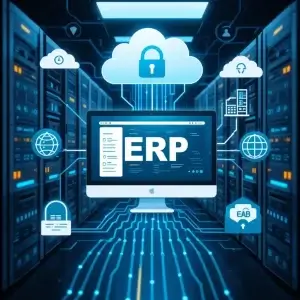Over recent years, ERP has become crucial for businesses of all scales. Nevertheless, there is a common misconception about the necessity of using ERP systems in large companies only. While such systems are most commonly associated with complex, large international organizations, it is important to state that for small and medium-sized enterprises, too, it can be really useful in the UAE.
In today’s competitive market, SMEs face numerous challenges, ranging from operational inefficiencies and compliances with local regulations, including VAT, to scaling up. An ERP system aids in smoothening the business processes, making data more accessible, thereby assisting in growth. The implementation of an ERP system is no longer a luxury but rather a strategic choice for UAE-based SMEs to help increase efficiency and profitability manifold.
Signs Your SME Needs an ERP System
As businesses grow, so does the need to have smooth operations. Most SMEs in the UAE reach this point where the existing systems aren’t good enough to handle these growing complexities. If you can relate to any of these signs, you may want to consider an ERP solution for your business:
Battling Process Inefficiencies
Inefficiency due to manual work, such as data entry and document processing, causes delays and errors. These inefficiencies translate to time and resources wasted that should have been used in expanding the business.
Besides, in the absence of an integrated system, different departments function in isolation, and errors and miscommunication are sure to happen. For SMEs in the UAE, an ERP system removes these inefficiencies by automating tasks and offering a single platform where all functions of the business are integrated.
Limited Visibility into Business Operations
The focus is on real-time visibility into your business data, which can be used to make informed decisions, but the smallest businesses in the UAE still operate an aged system or spreadsheets that are sometimes inconsistent and inaccurate.
Lack of visibility to performance, inventory management, or financial health up to the task is a challenge. With an ERP system, you have real-time reports, deeper insight into your operations, and decisions based on reliable information.
Increasing Operational Complexity
As your business expands, so does its complexity. It becomes challenging to handle multiple locations, employees, or suppliers without the right tools. SMEs in the UAE have an added layer of complexity due to compliance with VAT regulations, which makes it even more important to have a system that can efficiently handle these requirements. An ERP system makes multi-location management easier, information centralized, and compliant with the UAE’s tax laws.
Reliance on basic tools:
Most SMEs in the UAE rely on basic tools, including spreadsheets or stand-alone software, for various activities that may not be relevant or efficient beyond a certain period or business size.
It leads to fragmented information and decision-making issues because of the inability to scale up and integrate various systems. An ERP solution will help a business integrate all its operations on one platform, making the data accurate, consistent, and scalable for further growth.
Benefits of ERP Systems for SMEs in the UAE
Adopting an ERP system allows SMEs, especially in the competitive and fast-paced market of UAE, to enjoy a lot of benefits accruing from its adoption. Be it financial management or customer relations, the small business operates differently with the application of an ERP solution for transformation, scaling up, and, finally, actual growth. Main advantages of using ERP systems:
Improved Financial Management
One of the most valuable advantages of an ERP system is improved financial management. In the UAE, one of the main concerns for any SME is to remain VAT-compliant. The latest ERP solutions have VAT compliance tools integrated that automatically calculate the tax and generate all the required reports while keeping the business in compliance with local regulatory requirements.
Besides, these systems provide real-time financial tracking and reporting, allowing the business owner or manager to peer more deeply at cash flow, profitability, and financial health. With timely, accurate financial data, decision-makers can make wiser choices and avoid costly mistakes.
Smarter Productivity and Collaboration
ERP system means a centralized platform where all business data is stored and can be accessed by authorized users. This integration boosts productivity to a great extent by reducing manual data entry, minimizing errors, and streamlining operations. Employees can access real-time information, collaborate effectively across departments, and work on tasks without delays.
Also, by automating core, mundane tasks of inventory tracking, order processing, and financial reporting, all the vital man-hours that are freed up can be invested in higher-order activities. Enhanced collaboration results in better overall efficiency, which is paramount for SMEs who are attempting to remain competitive within the UAE market.
Scalability and Growth Readiness
As the business grows, so do the needs. It then naturally follows that an ERP system will grow transparently with it, whether by expanding into new locations, taking on more employees, or launching new product lines. The ERP solution evolves to meet the changing demands.
This scalability is particularly important to SMEs in the UAE since most businesses stand at the crossroads of growth and require systems that can scale accordingly. The flexible deployment options offered by the cloud-based ERP solution ensure that their business can access the system from anywhere, even when operations scale across regions.
Better Customer Management
Customer satisfaction and retention are the keys to any business, and ERP systems offer SMEs in the UAE a better avenue toward customer relationship management. ERP systems integrate the CRM feature, providing an overall view of customer data for personal service.
SMEs can track customer interactions, manage sales pipelines, and address customer inquiries more effectively. With ERP solutions, businesses can improve response times, anticipate customer needs, and deliver superior service, ultimately boosting customer loyalty and retention.
Choosing the Right ERP Software for SMEs
Therefore, it is very critical to select the appropriate ERP software for a UAE-based SME. While there is a multitude of options in the market, comprehension of your unique needs and identification of the right solution that can effectively aim at your business goals is a must. Key considerations while selecting ERP software for your SME:
H3 – Understand Your Business Needs
Before investing in an ERP system, it’s essential to thoroughly assess your business’s operational challenges and future growth plans. Identify which processes require improvement, whether it’s finance, supply chain management, inventory tracking, or HR.
Although ERP systems are versatile in their functionality, it is important to select a solution that meets just your needs. By knowing your pain points and growth objectives, you will be able to ensure the system can provide the necessary functionality to support current and future operations.
Look for UAE-specific Features
When choosing an ERP system for your SME in the UAE, make sure that it has features that relate to the local market. For example, VAT compliance is a huge requirement within the UAE, and not every ERP system can provide the tools necessary for calculating tax and reporting it according to the UAE regulations.
Also, the multilingual interface and UAE-specific tax configuration will help enhance user experiences and assure compliance with the law. A system built keeping the UAE in mind will surely provide more practical support and also reduce the probability of non-compliance.
Ensure Scalability and Integration
The right ERP system should be able to scale with the growth of your business, whether you are expanding to new locations or increasing your workforce and diversifying your product offerings.
It should also be integrated into the already operational tools and technologies. Find a system that’s easily integrated with any other software solutions to account for the tools or customer relationship management systems, so that it can keep your business functioning without a snag.
Consider Cloud-Based Solutions
Cloud-based ERP solutions for SMEs have been gathering fast momentum in the UAE, as they are cost-effective and accessible. These systems give several advantages like access anywhere, anytime, with reduced upfront costs and easier maintenance.
With cloud-based ERP, there’s no need to invest in expensive IT infrastructure or software updates. This makes it perfect for small businesses lacking in IT resources. Cloud-based systems again offer flexibility, enabling SMEs to scale in line with changing requirements over time.
Key Questions to Ask When Selecting ERP Software
With an ERP system, selecting it involves a very key investment for any SME; hence, asking the right questions forms the basis of making an effective decision. In ensuring the ERP system will meet your needs and provide long-term value, consider the following key questions:
What Are My Business Priorities?
Before diving into ERP selection, you need to have a clear understanding of your business priorities. Which processes in your organization need the most immediate improvement? Is your primary goal streamlining financial reporting, enhancing inventory management, or improving customer service?
By defining your short-term and long-term goals, you will be able to prioritize functionalities that are highly important for the business. Your priorities will also guide you in selecting the right ERP system, which will assist you in achieving your objectives and continued growth.
How Easy Is Implementation?
The implementation of the ERP system is rather complex, and the last thing you would want is for the implementation process to affect your operations. You need to find out how the implementation process would take, and what resources will be needed.
Ask about the ERP vendor’s support services, specifically for businesses in the UAE, where local compliance and regulations play a significant role. Find out if they provide on-site support, training, and guidance during the deployment phase to ensure a smooth transition to the new system.
Can the ERP Scale with My Business?
Your ERP system needs to grow with your business. Will the software meet your future needs in terms of more locations, additional departments, or an increased portfolio of products? It is important to find an ERP solution that is scalable so upgrades can be made, adding features and functionalities when your business has grown further.
Ask for the capability of the system from vendors in terms of multi-location or multinational operations. This is very important if you plan to expand beyond the UAE borders. A scalable ERP system ensures that you don’t have to upgrade or change your system while your business expands.
What Is the Total Cost of Ownership?
The cost of ERP software is much more than the cost of buying or subscription. Consider all aspects of the TCO, including licensing, maintenance, training, and support. Cloud-based ERP solutions generally have lower upfront costs but may include ongoing subscription fees, while on-premise solutions may have higher initial costs but lower recurring expenses.
In addition, add the cost of training your personnel to continue offering support. You will be in a better position to decide which option works best for your company by calculating the total cost of the ERP system.
Common Challenges and How ERP Solves Them
The following are some of the problems for which an ERP system may be implemented by SMEs, especially in a vibrant market like the UAE. From VAT compliance to resource management, ERP systems offer solutions that smoothen processes and enhance the accuracy of data while ensuring smooth operations. Below are some of the common challenges faced by SMEs and how an ERP system can help solve them:
VAT Compliance in the UAE
Since the introduction of VAT in the UAE, businesses need to be quite sure that their tax calculations and reporting are accurate and meet local regulations. ERP systems have automated VAT tools that calculate taxes based on real-time data and generate reports according to UAE tax standards.
This automation eliminates human errors and keeps business entities audit-ready at any moment in time. Integration of the system allows SMEs to track their liabilities for taxes in a much simpler way and, thus, never miss updates on changes in the tax laws; hence, keeping away the headaches caused by manual tax preparation and potential compliance issues.
Resource Management
For small businesses, where optimization of the workforce and inventories is necessary, resource management becomes critical. ERP provides real-time tracking of inventory to ensure that a business knows what product how much of it is in stock, and what should be ordered.
The systems further ease the process of workforce allocation and scheduling for SMEs to derive maximum returns using the available resources by keeping overhead costs as low as possible. By providing full visibility into all resources on a single platform, ERP solutions improve decision-making and resource utilization, hence operational efficiency.
Data Silos
Most SMEs have an issue of information fragmentation, where all the data is divided among various departments or software installations. This usually results in inconsistency in data, inefficiency, and bad decisions internally. ERP systems resolve this by consolidating all business data onto one platform, where different departments can draw upon the same information in real-time.
It enables a business to avoid data silos, increases collaboration, and allows one source of truth for decision-makers with one unified system. That leads to better alignment within the various departments, and more accurate reporting.
Conclusion
In the end, the ERP system will help SMEs in the UAE enhance their operations by strengthening productivity and ensuring that they comply with local regulations. By managing VAT compliance, improving financial visibility, optimizing resource allocation, and eliminating data silos, ERP solutions have a fit-for-purpose approach for organizations of all sizes.
Any ERP system for an SME in the UAE needs to be chosen with a perspective on both the current needs and future growth. Key factors will include the scalability of the system, ease of implementation, and UAE-specific features that include compliance with VAT and localization options. With the right choice of an ERP system, businesses can work in an optimized way for future success in the highly competitive market.
As the UAE business environment continues to evolve, SMEs should be better equipped to adapt efficiently and effectively. An ERP system for small businesses will provide the flexibility, efficiency, and support one needs to thrive in 2025 and beyond. The time has come for SMEs to assess their readiness, explore tailored ERP solutions, and take the next step toward operational excellence.



